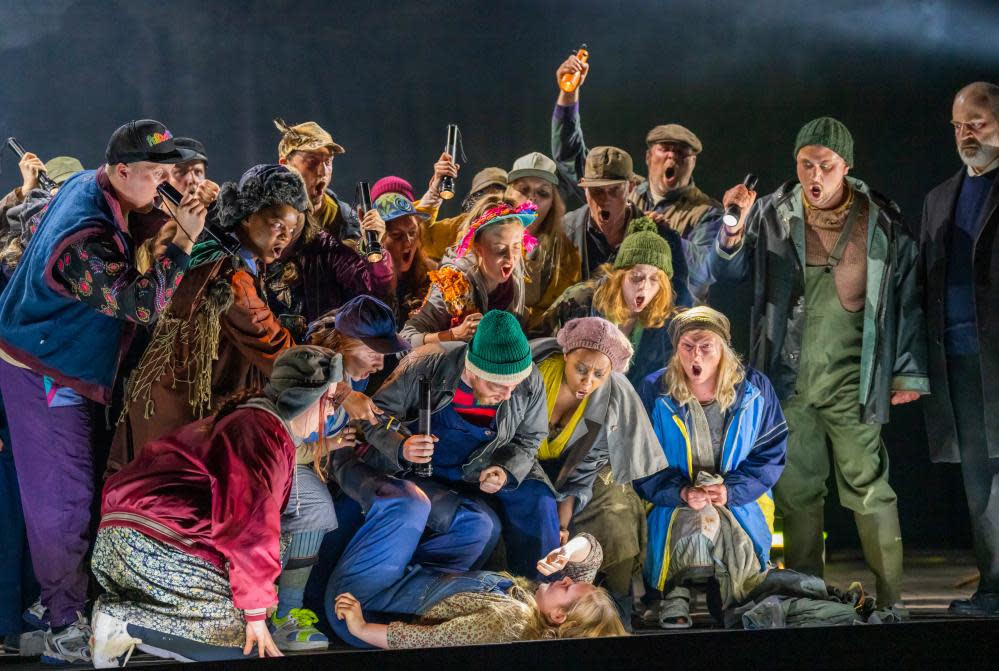The week in classical: The Wreckers; Kirill Gerstein

Tossed on the high seas of misogyny, capsized by an overload of anecdote about her character and habits, Ethel Smyth (1858-1944) remained gung-ho (her kind of word) about the professional frustrations she faced. Ahead of Glyndebourne’s new, and rare, staging of her opera The Wreckers (1906), a flurry of articles have celebrated her eccentricities. More importantly, they have drawn attention to her pioneering efforts as a composer, for a time moving at the centre of European musical life. If you don’t know her story, including the bit about the toothbrush, it’s worth looking up.
Smyth’s timing was unlucky. Her three-act opera is spoken of as prefiguring Britten’s Peter Grimes (1945), on the slim evidence that both have a coastal setting and a choral-community presence. Britten’s work, so triumphant from the outset, in effect wiped the British operatic slate clean; Smyth’s work had hardly established itself and now was outmanoeuvred by that of a youthful newcomer. The Wreckers had initial interest after its 1906 premiere in Germany, but fell from view, not helped by Smyth’s tendency to antagonise those around her.
Glyndebourne has invested boldly, with 10 performances, none yet sold out, and a well-executed production. All praise to their courage. The work deserves its revival, whatever its shortcomings, which might be summed up as long and loud. There is more to it. Melly Still’s staging, conducted by Robin Ticciati with the London Philharmonic Orchestra in the pit, restores Henry Brewster’s original French libretto. It also reinstates half an hour of cuts (thanks to extensive work by Glyndebourne librarian Martyn Bennett and team).
Only in the prelude to the second act, sensuous and delicate, do we get a hint of an individual voice
The story is a tangled moral thicket. Impoverished Cornish villagers lure ships on to the rocks by extinguishing warning beacons, killing and pillaging as they go. Through the stern voice of their leader and pastor, Pasko (Philip Horst), God spurs them on. Unfortunately, Pasko’s young wife, Thurza (Karis Tucker), is in love with handsome Marc (Rodrigo Porras Garulo). They are discovered, fanning the flames both of an illicit beacon and their incendiary passion, and condemned to death. The tide is rising. Their fate is sealed, like a wet version of the lovers in the vault at the end of Verdi’s Aida.
Smyth’s music is approachable, tuneful, varied, much of it in a mood of prolonged urgency that becomes tiring. A soup of styles, from Wagner and Bizet to Gounod and Richard Strauss, it swirls and lurches from one idiom to another. Only in the prelude to the second act, sensuous and delicate, do we get a hint of an individual voice. The rip-roaring choruses are excellently sung and acted, but the main characters are poorly defined. If only we cared more, despite the best efforts of all involved in the performance, about the drama unfolding.
Designed by Ana Inés Jabares-Pita (with lighting by Malcolm Rippeth), Still’s staging relies heavily on dry ice, a simple mobile stairway and platform, and generic modern clothes. The wreckers’ gloomy world is a black abstract space with sea-scape (video by Akhila Krishnan). The cast tackle Smyth’s vocal writing admirably, with Porras Garulo ardent in the high-lying role of Marc. The young villager Avis, spurned in her love for Marc, is well taken by Lauren Fagan, fearless and excitingly accurate in this taxing part. Horst, as Pasko, added much beyond the music, especially at the end, in his agony unable to turn away from his adulterous wife in her lover’s arms: the most moving part of the drama.
Jeffrey Lloyd-Roberts, Marta Fontanals-Simmons, Donovan Singletary and, notably, James Rutherford added to a committed cast. The LPO played with expertise and assurance, as if this were familiar terrain, not a substantial and demanding novelty. A neighbour in the audience, pursuing academic studies on Smyth, had travelled from North Carolina to see it. She was thrilled. So too were the audience; the production delivers a powerful coup at the end. A semi-staged performance will be at the Proms on Sunday 24 July.
The Soviet-born American pianist Kirill Gerstein, a musician who does nothing by halves, has had a busy few weeks, giving benefit concerts for Ukraine – he was one of the first musicians to condemn the war – in Berlin and Vienna, where he also replaced the indisposed Daniel Barenboim. Nevertheless, he was on peak form for his recital at the Queen Elizabeth Hall on Wednesday. After Stravinsky and Schubert, he devoted the second half to Liszt. As if preparing himself for the perils ahead, Gerstein first explored the interior meditations of the Bénédiction de Dieu dans la Solitude.
He then followed straight on with the bass-note rumbles that herald the mighty B minor Sonata. Four movements rolled into one, it requires the firmest steer from the pianist to guide the listener through its chromatic tempests and serene, giddying transformations. Otherwise it’s a bore. Clara Schumann, when she first saw the manuscript – dedicated to her husband, Robert Schumann – feared it was “nothing but sheer racket”. She needed Gerstein. Without histrionics, clear-sighted, virtuosic, he showed us why this is a masterpiece. What a dazzling player.
Star ratings (out of five)
The Wreckers ★★★★
Kirill Gerstein ★★★★★
The Wreckers is at Glyndebourne, Lewes, East Sussex, until 24 June and at the BBC Proms and on Radio 3/BBC Sounds on 24 July

 Yahoo Movies
Yahoo Movies 
